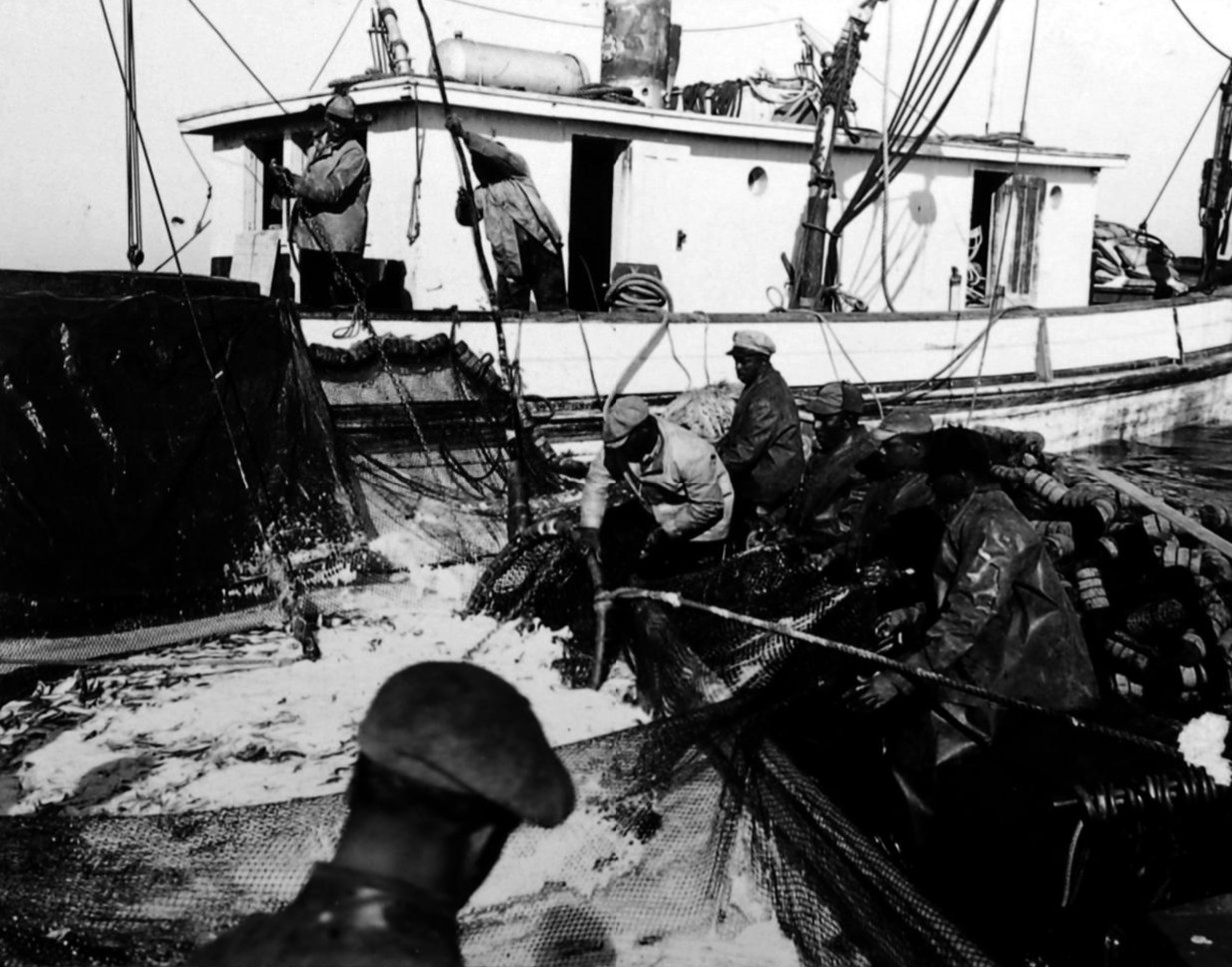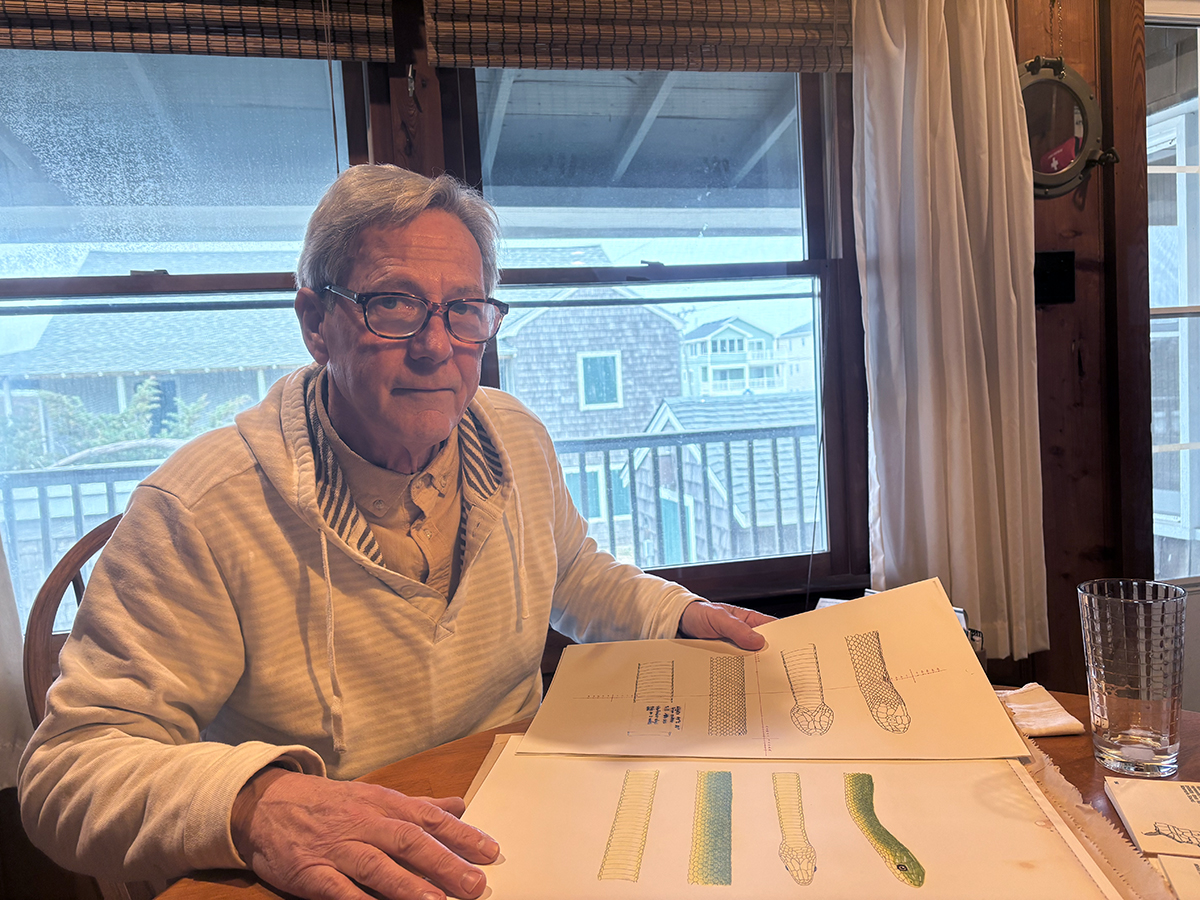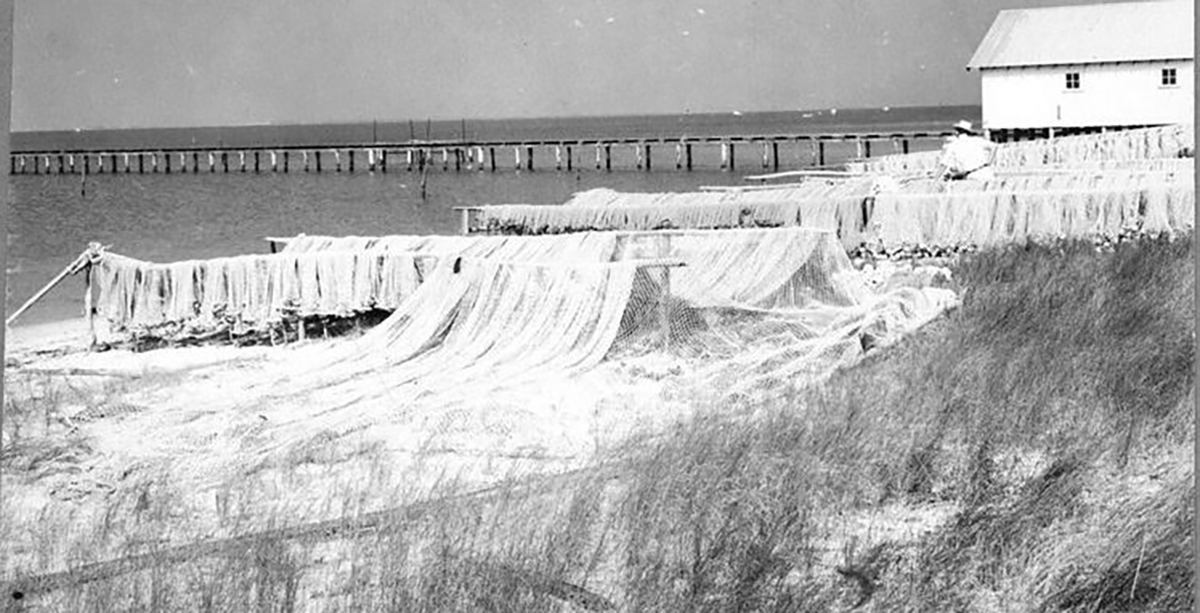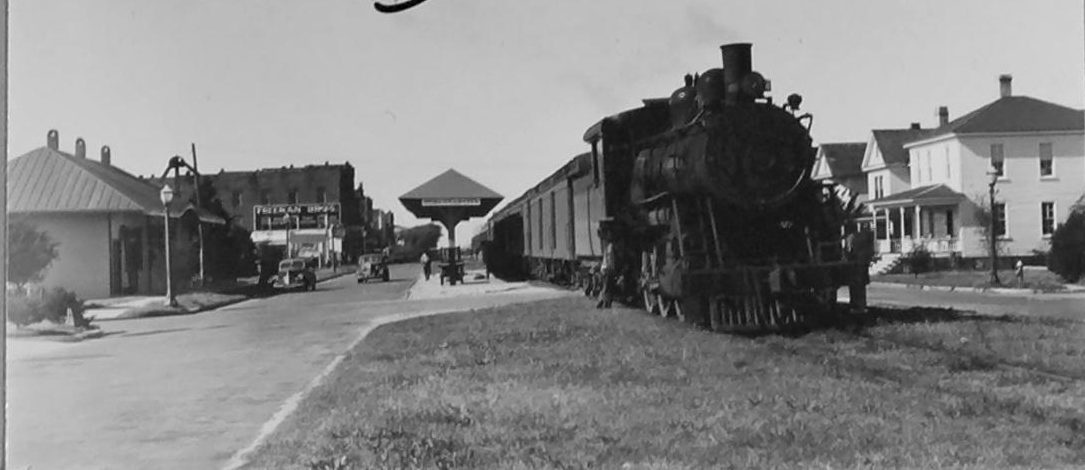MOREHEAD CITY – This is a tale about a fish house liar whose famous words could be “I’ll tell you this story.”
The Morehead City local may not be as well-known outside this town in Carteret County, but around here Rodney Kemp is somewhat of a celebrity for telling entertaining stories about local history.
Supporter Spotlight
“In the days before mass communication, down at the community store or the fish house, the entertainment in the evening was the guy who could tell stories,” says Kemp.
Kemp, 68, keeps that tradition alive. He says he’s the last of Morehead City’s fish house liars, as they’re called, who still tells audiences the local lore he grew up hearing. And just like the fish house liars before him, he’s known to embellish the truth to please a crowd.
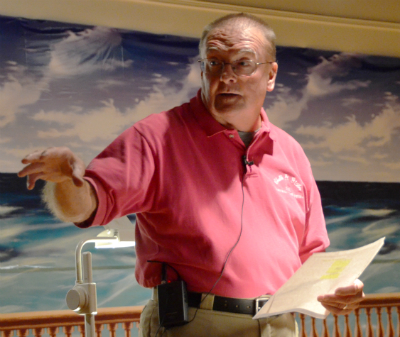 Rodney Kemp delivers a talk about a piece of Morehead City’s history to a crowd last Friday at The History Place. The series “Fridays with Rodney Kemp” have been a hit since they began in 2000. Photo: Tess Malijenovsky |
“It’s stories that are on the edge of the truth, but if you tell them right they’re almost believable,” he says. “In your mind you tell them so much, you get so you don’t know the difference between a lie and a truth.”
People don’t mind that, he says. “You can wrap a lot of local history around humor because people are humorous here, particularly when they’re out on the water and they haven’t caught a fish all day.”
Kemp cracks jokes as he transitions in his history talks, moving the next photo onto the old overhead projector. In his pile are also article clips and notes handwritten in Magic Mark on sleeve protectors, like the ones found in a student’s binder. He keeps an informal, conversational tone – short, sweet and to the point.
Supporter Spotlight
“You’ll see I’m pretty much getting to the punch line the best I can,” Kemp says.
He invites the crowd — sometimes calling on an audience member by the first name — to tell the history as they remember it, too. The talk becomes a dialogue; and the history, sometimes someone’s childhood, is born again.
“The stories reminds me of the things I’ve forgotten,” says Jean Lewis, one of Kemp’s time-honored fans who was sitting in the front row at his talk last week at The History Place. The monthly history talks, “Fridays with Rodney Kemp,” just started its fall season series.
“And he’s really funny,” she adds.
As far as Kemp’s story, he’ll tell you: “The basis of my history is I’ve been here forever, and that’s a blessing.” The man has a tremendous amount of affection and gratitude for his upbringing in Morehead City and for its people.
Kemp was born in Knoxville, Tenn., but moved to Morehead City when he was two and a half years old. He says it was a blessing to grow up during the 1950s in “small-town USA” in a “Leave it to Beaver” neighborhood. The kind where the lady at the corner shop calls your mother to let her know where you are; the kind where everyone goes to church together.
“Boy, I can’t believe I was fortunate enough to have grown up in that neighborhood,” says Kemp, regretting that the same sense of community changed by the time he had children and grandchildren.
He was the middle child of five. His father was a garment maker from Pennsylvania who liked to tell stories at night around the supper table. His mother, from Alabama, was always at home to greet him from school, and she instilled in him her love of poetry. He was always more interested in playing sports than schooling. Athletics, he says, was his form of expression.
Kemp lived nearly half a lifetime before he ever gave his first professional speech. He went to college in Texas where he studied journalism, English and history. He came back to Morehead City and became a school teacher. He coached basketball, ran 12 marathons and married Pat Giblin, “the most beautiful woman I’d ever met.” They had two daughters and a son. Kemp took a job as an insurance salesman in Wilmington.
He wasn’t in Wilmington long before he returned to Morehead City in 1987 to take a job with Chalk & Gibbs, where he still works today selling insurance. After all, he’s known his bosses since they were four and five-years-old. But, if it wasn’t for his three-year stint in Wilmington, Kemp might have never realized his talent for public speaking.
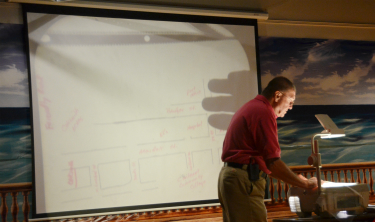 Rodney Kemp uses the overhead projector to enhance his presentation with old photos, articles and notes. Photo: Tess Malijenovsky |
He was selling car insurance to a woman one day, and when she handed him her business card, he glanced down and read the words “motivational speaker.”
“I’d love to do that,” he said.
“You can,” she said.
“How do you know that?” Kemp asked.
“‘Cause you want to do it.”
The woman encouraged him to sign up for his first talk at the Lion’s Club, a service organization in Wilmington. After his first motivational speech, he called her back and said, “It worked!” As though in disbelief.
“My nature is not to be a performer,” he says. “Now people say, ‘Now you don’t look nervous.’ I say, ‘I’m torn up until I get going, and I hear that first response from the audience.’”
Kemp delivers upwards of 150 talks a year. He writes out his stories, puts the punch lines in just the right order and practices either in front of a mirror, his family or school children – his toughest audience. Back in his marathon-training days, he would listen to speeches on headphones, too.
He taught history in a continuing-education class at the local community college for 20 years. He’s been speaking at the Elderhostel program, known as Road Scholar, at the Trinity Center in Salter Path since 1991. And he’s been telling stories at the History Place since the museum bought the old colonial store next to his office in 2000. He continues to draw large crowds. Kemp also gives sermons in churches, and he’s even taken to telling the history of others.
Through it all, Kemp’s wife, Pat, battled cancer six times over a period of 19 years. He described her as courageous, never letting on to what she was going through for the sake of not burdening her family. Kemp said he was shocked when the doctor pulled him aside, six years ago, to tell him she wasn’t going to be coming home.
“She went home alright. Don’t worry about that,” says Kemp. “She just isn’t coming back to Morehead with us.”
Kemp still wears his wedding ring, he says, because he was very blessed in his 35 years of marriage.
He wasn’t sure what it meant to mourn, but he found he couldn’t sleep in the bedroom anymore. He moved in with his younger brother in an area of Morehead City known as the Promise Land. As many times as he had read, written and talked about the Promise Land, he’d never come to know it so intimately. He soon found solace in the “precious” neighborhood where the descendants of Diamond City migrated after a hurricane destroyed their homes on Shackleford Banks.
“I would sit across there on the porch, particularly in the rain storms, and I’d look around and I’d think: ‘You know what? This place is absolutely mind-boggling beautiful.’ And it’s not because they’re elaborate houses. Promise Land houses were modest; some of them floated across from the Banks. I would talk to [the Promise Land people], and I realized how much they loved their heritage of a sharing community, even greater than the one that I described where I grew up — greater than that.Across the street from his brother’s home is the preserved house of Capt. Gibb Willis. Kemp crosses the street to sit on the porch, with permission, and rock in the evening. He says:
“I don’t know who I thought I was. I decided that we need to record the history of the Promise Land before we lose it.”
Kemp put an announcement in the paper that the first meeting of the Promise Land Society would be held June 10, 2012, at the Franklin Memorial Church. A few friends showed up, fearing no one else would.
“There were a hundred there, and I didn’t know what I was getting in to,” Kemp says.
Since, the Promise Land Society has published two books about their history with a third in the works.
“I am very honored and blessed to have him as a friend,” said Janice Ray Lewis Ditto, one of Banks’ descendants. “I’m so grateful that he pulled the Promise Land people together to get our history and great stories and memories written before they all pass away.
“Promise Landers are peculiar people. I’m but one of them,” Ditto said. “With his personality and ability, we took him in as a great friend.”
“I don’t know why other than the Lord gave me a gift that he wanted me to use, I don’t know why I get these opportunities, but I don’t mind it,” Kemp says. “All that stuff is part of my makeup, the evolution of Rodney Kemp.”



